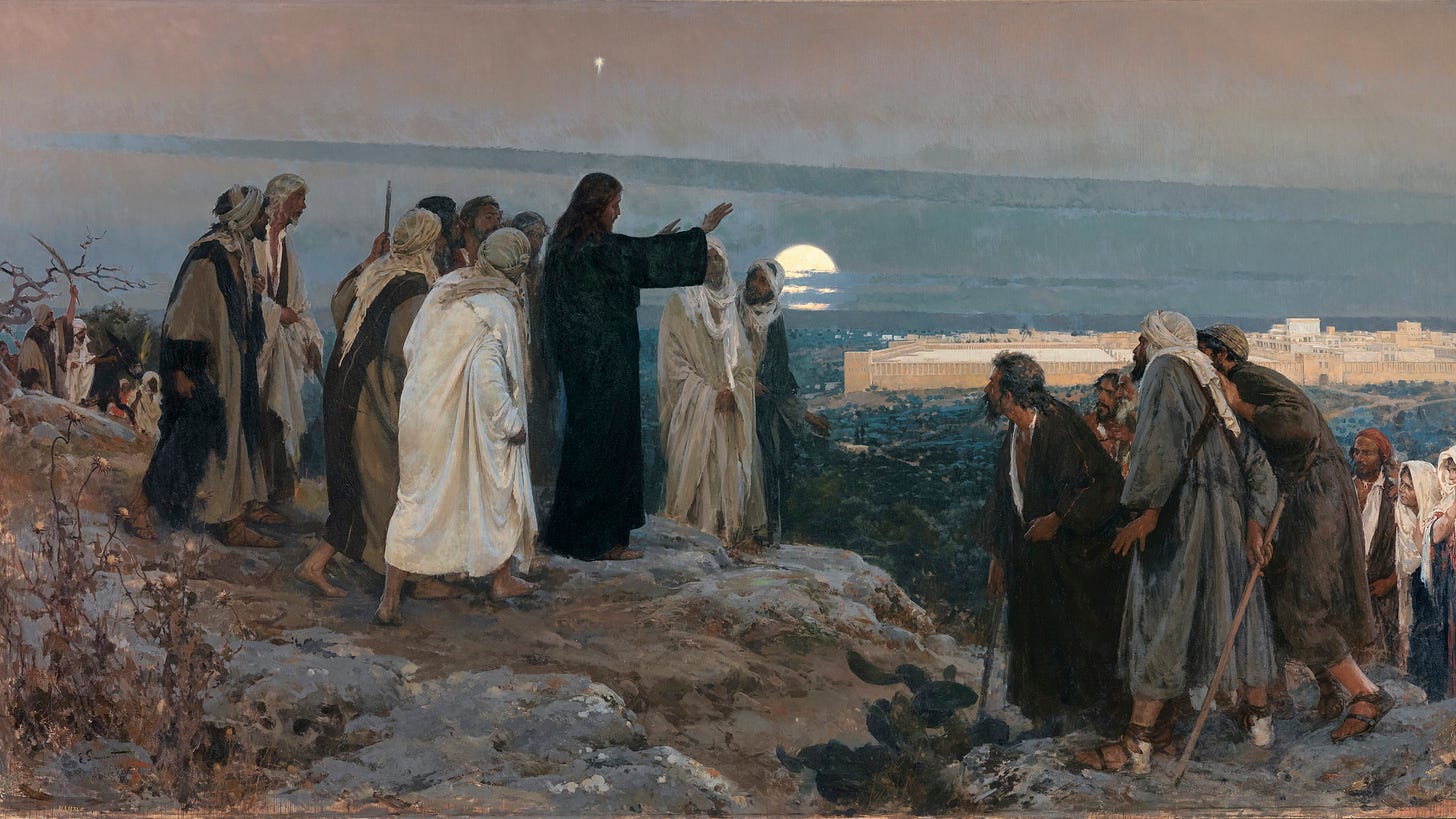
It was not too late for them to repent.
Editor’s Notes
In this Part, Fr. Coleridge tells us…
How Christ’s lament reveals both His sorrow and the justice of divine retribution.
That sin’s blindness invites judgment, but still stirs compassion in the Heart of Christ.
Why His tears are shed not for Himself, but for Jerusalem’s refusal of grace.
He shows us that God delays vengeance in hope of repentance, but will not delay forever.
There is so much material that we could share during Holy Week. Rather than trying to provide it all, we will instead focus on how and why Christ’s triumphal entry into Jerusalem provides a key to the whole of his blessed and glorious Passion.
The Procession of Palms
Passiontide, Part I, Chapter II
St. Matt. xxi. 14-17; St. Mark xi. 1-11; St. Luke xix. 29-44; St. John xii. 12-18.
Story of the Gospels, § 132
Burns and Oates, London, 1889
Headings and some line breaks added.
Sung on Palm Sunday
Our Lord casts reserve aside and enters Jerusalem as Christ the King
What was it about Palm Sunday that most surprised the Pharisees?
View of Jerusalem
It will naturally occur to us how aptly the thoughts which are suggested by these words of our Lord, concerning the stones crying out, harmonize with those others which were used to the proud and ungrateful Jews at the beginning of the Gospel, when St. John told them not to build on the fact that they had Abraham to their father, because God was able of those stones to raise up children unto Abraham.
They also prepare very beautifully for the incident of which we are next told by the same compassionate Evangelist who has preserved the words of our Lord on which we have been dwelling.
The remarks of the Pharisees in criticism on the enthusiasm of the disciples with which these Pharisees found so much fault, must have put before our Lord’s mind the whole history, as has been said, of the treatment which He had received from the authorities of the holy nation, and this would naturally suggest the mournful thought of the retribution which was to fall on them in consequence. Their neglect and coldness was soon to appear to all the world ripened into the blackest hostility, and at last into the crime of His murder, which was to bring on the nation and city a temporal chastisement, such as the world has never heard of before or since that time.
Just at that point of the procession which was moving on to Jerusalem, we are told that a turn of the road round one of the shoulders of the Mount of Olives, spread before the eyes of our Lord the sight of the beautiful city itself in all its magnificence, bathed in the warm glow of the afternoon sun. Jerusalem had never been more glorious to outward show than at that time of her history, when the restorations of the Temple by Herod had lately been completed with great splendour. It lay there before our Lord, with all its towers and pinnacles, its golden roof and marble porticoes, hiding all the sin and ingratitude that had been, and the far greater sin that was to be accomplished within so short a number of days, in the blaze of its splendour, as if angels had built its walls and none but saints had thronged its courts.
Could anything be more worthy of the majesty of Him for Whom it was built? Alas! the show was fair indeed, and there were no longer the outward abominations of idolatry in the Temple and the city which had been shown in the vision to Ezechiel.
‘Every form of creeping things and of living creatures, the abominations and all the idols of the house of Israel painted on the wall round about… seventy men of the ancients of the house of Israel that stood before the pictures, and every one a censer in his hand, and a cloud of smoke that went up from the incense… and women sat there mourning for Adonis… and five and twenty men having their backs towards the Temple of the Lord and their faces to the east, and they adored towards the rising of the sun.’1
Those visible abominations were done away after the great chastisement of the Captivity, but what were they in comparison to the guilt of the murder of the Incarnate Son of God, which was already accomplished in the hearts of the Chief Priests, and in which the very people that were now crying Hosanna were so soon to claim their part in the fearful cry, ‘His Blood be on us and on our children?’
The Father Coleridge Reader is a labour of love. But curating, cleaning up and publishing these texts takes a lot of time. Every now and then, we have to make one of the posts for members only, in order to keep it going.
Please consider joining us with a subscription!



